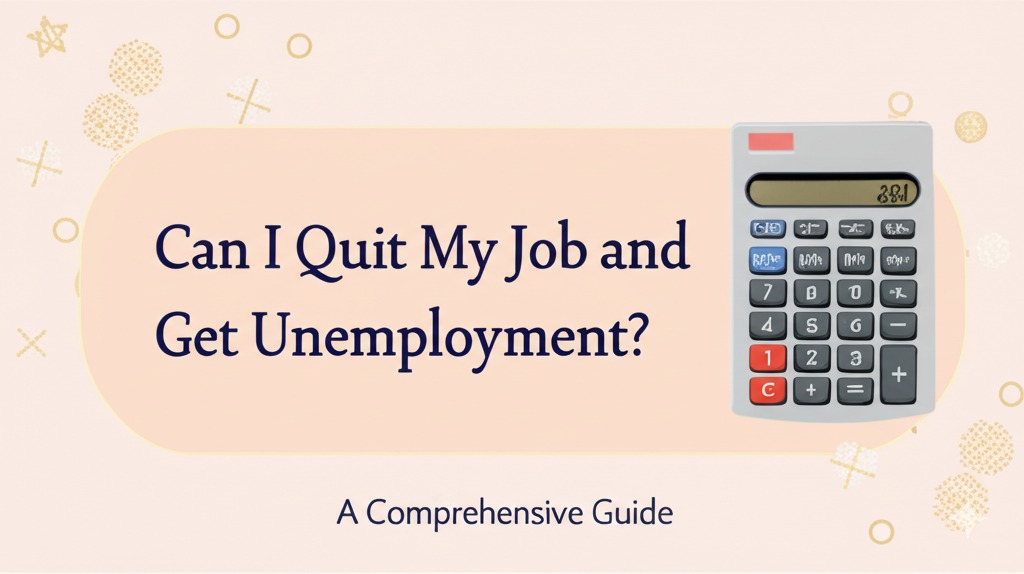
Are you considering quitting your job and wondering if you’ll still be able to receive unemployment benefits? This is a common question many workers have when they’re unhappy in their current role but are unsure of what comes next. While the answer depends on various factors, understanding how unemployment benefits work and whether you qualify after quitting can help you make an informed decision. In this article, we’ll explore the ins and outs of quitting your job and whether you can qualify for unemployment benefits.
What Are Unemployment Benefits?
Before diving into whether quitting your job affects your eligibility, let’s first understand what unemployment benefits are. Unemployment benefits are financial assistance provided by the government to individuals who are unemployed through no fault of their own. These benefits are typically designed to help you cover basic living expenses while you search for a new job.
Unemployment insurance (UI) is available through federal and state programs, and eligibility requirements can vary depending on your location. In general, you must have worked for a certain period and earned enough wages during that time to qualify for benefits.
Can I Get Unemployment If I Quit My Job?
The short answer is: it depends. In most cases, if you voluntarily quit your job, you won’t be eligible for unemployment benefits. However, there are several exceptions to this rule. To qualify for unemployment after quitting, you must meet certain criteria and prove that you had a valid reason for leaving your job.
Valid Reasons for Quitting and Eligibility for Unemployment
If you quit your job due to one of the following valid reasons, you may still be able to qualify for unemployment benefits:
1. Unsafe Working Conditions
If your workplace poses a serious health or safety risk, quitting may be justified. For example, if you’re exposed to hazardous chemicals without proper safety equipment, or if the physical environment is dangerous, you may be able to file for unemployment benefits after resigning.
2. Harassment or Discrimination
If you are experiencing harassment or discrimination based on factors such as gender, race, religion, or disability, and your employer has failed to address the issue, you may be eligible for unemployment benefits after quitting.
3. Medical Reasons
If you have a medical condition that prevents you from doing your job or if your employer does not accommodate your condition, you may qualify for unemployment after quitting. However, you will likely need documentation from your doctor.
4. Significant Life Changes
In some cases, significant life changes, such as relocating due to a spouse’s job transfer or needing to care for a family member, can be considered valid reasons for quitting. Documentation and proof of the situation will be required.
5. Non-payment of Wages or Breach of Contract
If your employer has failed to pay you for work completed or has breached the terms of your employment contract, you may have grounds for quitting and still be eligible for unemployment.
How to Prove You Left for a Valid Reason
When you apply for unemployment after quitting, you’ll need to provide evidence supporting your claim. This could include:
- Documentation from a healthcare provider for medical reasons.
- Proof of unsafe working conditions (such as photographs or official complaints).
- Evidence of harassment or discrimination (such as emails, witness statements, or reports made to HR).
- Proof of family obligations or relocation (such as a letter from your spouse’s employer or medical records).
What Happens if You Quit Without a Valid Reason?
If you quit your job without a valid reason, you generally won’t qualify for unemployment benefits. Common reasons for quitting that typically don’t qualify include:
- Personal dissatisfaction with your job (e.g., not liking the work environment or your tasks).
- Better job offer elsewhere (unless you can prove the new job offer was significantly better and within your field of work).
- Lack of career growth (unless you can show your employer made no effort to help you advance).
In these cases, your state’s unemployment office will likely deny your claim, and you may not receive any benefits. Keep in mind that each state has its own set of rules, so it’s essential to check your local unemployment office for specific guidelines.
How to Apply for Unemployment After Quitting
If you’ve determined that you may be eligible for unemployment benefits after quitting your job, follow these steps to apply:
- File a Claim: You can file an unemployment claim online through your state’s unemployment website or by visiting your local unemployment office.
- Provide Supporting Evidence: Be prepared to provide documentation that supports your reason for quitting, as discussed above.
- Attend a Hearing if Required: In some cases, the state unemployment office may require a hearing to determine whether you qualify for benefits. This will be your opportunity to present your case.
Key Factors That Affect Unemployment Eligibility
While quitting your job can impact your eligibility, there are other factors to keep in mind when applying for unemployment:
1. Work History
Your work history and how long you’ve been employed are critical factors in determining your eligibility. Most states require you to have worked for a certain amount of time and earned a minimum amount of wages in the past year.
2. Job Search Requirements
In most cases, to continue receiving unemployment benefits, you’ll need to show that you are actively searching for new employment. Failure to do so can result in the suspension or termination of your benefits.
3. State-Specific Rules
Unemployment laws vary by state, and each state has its own regulations regarding the reasons for quitting and eligibility. It’s important to check with your state’s unemployment office for specific rules.
Conclusion: Should You Quit Your Job and File for Unemployment?
Deciding whether to quit your job and apply for unemployment is a major decision that requires careful consideration. While it’s typically difficult to qualify for unemployment benefits after quitting, it’s not impossible if you have a valid reason for resigning. Before making any decisions, evaluate your situation, gather evidence, and consult with your state’s unemployment office to understand your rights and options.
If you’re considering quitting due to workplace issues, medical concerns, or family obligations, knowing your eligibility for unemployment can help you make a smoother transition. Always be sure to document your reasons and ensure you meet the necessary criteria to increase your chances of success.

Andre Cuevas provides career insights, job search strategies, and professional advice to help individuals navigate the job market and achieve their career goals.





